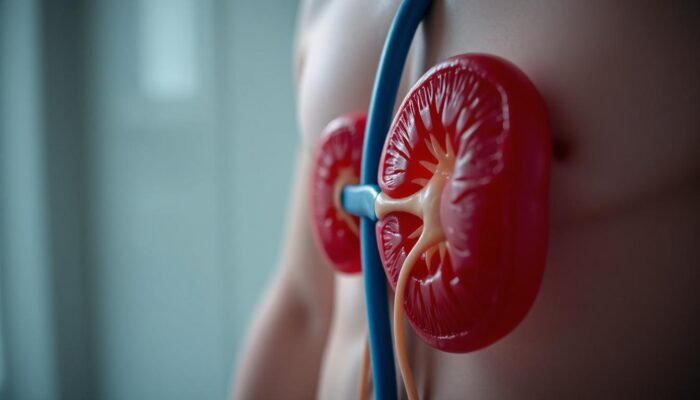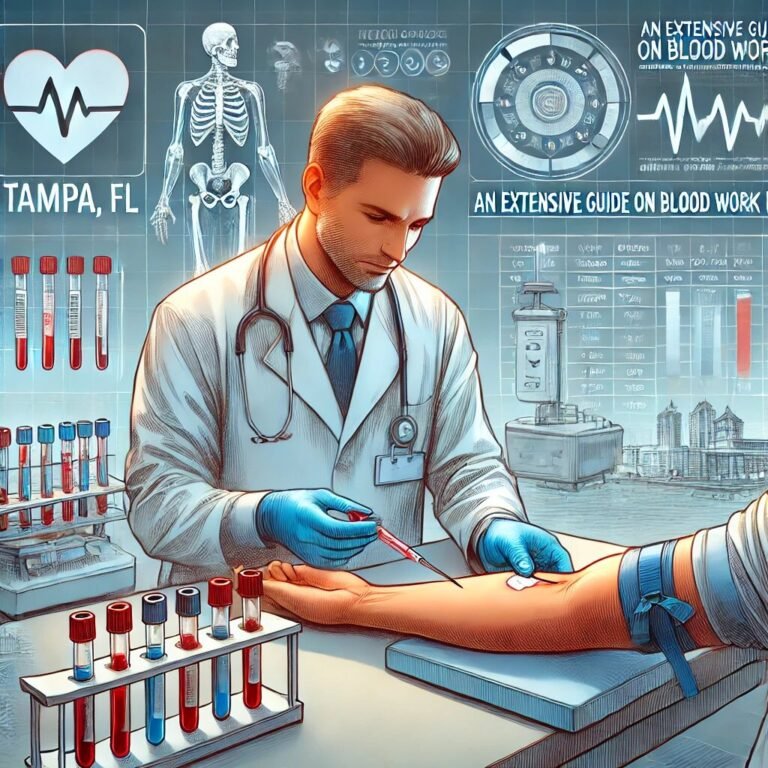Kidney Health and Its Impact on Your Body: World Kidney Day Highlights
The kidneys are among the most vital organs in the human body, playing a crucial role in maintaining overall health. They filter waste products, regulate fluid balance, control blood pressure, and produce hormones that are essential for red blood cell production and bone health. Despite their importance, kidney health is often overlooked until problems arise.
World Kidney Day, observed annually on the second Thursday of March, serves as a global reminder of the importance of kidney health and the need for awareness, prevention, and treatment of kidney diseases. In 2025, the theme for World Kidney Day 2025 will focus on the profound impact of kidney health on the body and the steps we can take to protect these vital organs.
The Role of Kidneys in Your Body

The kidneys are bean-shaped organs located on either side of the spine, just below the rib cage. Each kidney is about the size of a fist and contains millions of tiny filtering units called nephrons. These nephrons work tirelessly to remove waste products and excess fluids from the blood, which are then excreted as urine.
In addition to filtering waste, the kidneys perform several other critical functions:
- Regulating Blood Pressure: The kidneys produce hormones that help regulate blood pressure by controlling the balance of sodium and water in the body.
- Producing Red Blood Cells: The kidneys release erythropoietin, a hormone that stimulates the production of red blood cells in the bone marrow.
- Maintaining Bone Health: The kidneys convert vitamin D into its active form, which is essential for calcium absorption and bone health.
- Balancing Electrolytes: The kidneys maintain the balance of electrolytes, such as sodium, potassium, and phosphate, which are crucial for nerve and muscle function.
When the kidneys are not functioning properly, these processes are disrupted, leading to a cascade of health problems.
The Global Burden of Kidney Disease
Chronic kidney disease (CKD) is a growing public health concern, affecting approximately 10% of the world’s population. CKD is often referred to as a “silent killer” because it can progress without noticeable symptoms until it reaches an advanced stage. By the time symptoms appear, significant damage may have already occurred, requiring dialysis or a kidney transplant.
The prevalence of CKD is driven by factors such as aging populations, unhealthy lifestyles, and the increasing incidence of diabetes and hypertension. In countries like Australia, initiatives like World Kidney Day Australia have been instrumental in raising awareness about the importance of kidney health and promoting early detection and prevention.
The Connection Between Kidney Health and Overall Well-being

Kidney health is closely linked to overall well-being. When the kidneys are compromised, it can have far-reaching effects on the body. For example:
- Cardiovascular Health: CKD is a major risk factor for cardiovascular diseases, such as heart attacks and strokes. The kidneys play a key role in regulating blood pressure, and when they are damaged, blood pressure can rise, increasing the risk of heart disease.
- Bone Health: Impaired kidney function can lead to weakened bones and an increased risk of fractures. This is because the kidneys are responsible for activating vitamin D, which is essential for calcium absorption.
- Anemia: Damaged kidneys produce less erythropoietin, leading to a decrease in red blood cell production and resulting in anemia. This can cause fatigue, weakness, and shortness of breath.
- Immune Function: Kidney disease can weaken the immune system, making individuals more susceptible to infections.
World Kidney Day Conversations from 2006 until 2024
Here’s a table summarizing key themes and discussions from past World Kidney Day events:
| Year | Theme | Key Discussion Points |
| 2006 | Are Your Kidneys OK? | Raising awareness of kidney disease prevention and early detection. |
| 2007 | CKD: Common, Harmful, and Treatable | Emphasizing the global burden of chronic kidney disease (CKD). |
| 2008 | Amazing Kidneys | Highlighting the importance of kidney function in overall health. |
| 2009 | Protect Your Kidneys: Keep Your Pressure Down | The impact of hypertension on kidney health. |
| 2010 | Protect Your Kidneys: Control Diabetes | Diabetes as a leading cause of kidney disease. |
| 2011 | Protect Your Kidneys: Save Your Heart | The link between kidney disease and cardiovascular health. |
| 2012 | Donate – Kidneys for Life – Receive | Promoting kidney transplantation and organ donation. |
| 2013 | Kidneys for Life – Stop Kidney Attack! | Identifying and preventing acute kidney injury (AKI). |
| 2014 | Chronic Kidney Disease and Aging | Addressing CKD in the elderly population. |
| 2015 | Kidney Health for All | Ensuring global accessibility to kidney care. |
| 2016 | Kidney Disease & Children: Act Early to Prevent It! | Early intervention and pediatric kidney health. |
| 2017 | Kidney Disease & Obesity: Healthy Lifestyle for Healthy Kidneys | The role of obesity in kidney disease prevention. |
| 2018 | Kidneys & Women’s Health: Include, Value, Empower | Women’s kidney health and pregnancy-related risks. |
| 2019 | Kidney Health for Everyone Everywhere | Expanding access to kidney disease prevention and treatment. |
| 2020 | Kidney Health for Everyone Everywhere – From Prevention to Detection and Equitable Access to Care | Reducing the global burden of kidney disease. |
| 2021 | Living Well with Kidney Disease | Enhancing quality of life for CKD patients. |
| 2022 | Kidney Health for All: Bridge the Knowledge Gap to Better Kidney Care | Improving education and awareness about kidney health. |
| 2023 | Kidney Health for All: Preparing for the Unexpected, Supporting the Vulnerable! | Kidney disease preparedness in times of crisis (e.g., pandemics, natural disasters). |
| 2024 | Kidney Health for All: Advancing Equitable Access to Care and Optimal Medication Practice | Addressing disparities in kidney healthcare access. |
The Importance of Early Detection and Prevention
Early detection is critical for preventing the progression of kidney disease and improving patient outcomes. Simple tests, such as blood and urine tests, can help identify kidney problems at an early stage, allowing for timely intervention. Unfortunately, many people are unaware of these tests or do not have access to them, particularly in low-resource settings.
This is where awareness campaigns like World Kidney Day play a crucial role. By educating the public about the importance of regular kidney health check-ups, these initiatives can help bridge the gap in early detection and prevention. Additionally, healthcare providers can use this opportunity to emphasize the importance of lifestyle modifications, such as maintaining a healthy diet, exercising regularly, and avoiding smoking and excessive alcohol consumption.
Addressing Risk Factors for Kidney Disease
Several risk factors contribute to the development of kidney disease, including:
- Diabetes: High blood sugar levels can damage the blood vessels in the kidneys, impairing their ability to filter waste.
- Hypertension: High blood pressure can strain the kidneys, leading to damage over time.
- Obesity: Excess weight increases the risk of diabetes and hypertension, both of which are major risk factors for kidney disease.
- Smoking: Smoking reduces blood flow to the kidneys and can worsen existing kidney damage.
- Medications: Certain medications, such as nonsteroidal anti-inflammatory drugs (NSAIDs), can harm the kidneys if used excessively.
By addressing these risk factors, individuals can take proactive steps to protect their kidney health. For example, managing blood sugar levels, maintaining a healthy weight, and quitting smoking can significantly reduce the risk of kidney disease.
The Role of Medications in Kidney Health

Medications play a crucial role in managing kidney disease and its associated conditions. For example, Kamagra Jelly Online and Super Kamagra Tablets are commonly used to treat erectile dysfunction, but they can also have implications for kidney health. These medications work by improving blood flow, which is essential for maintaining kidney function. However, it is important to use them under the guidance of a healthcare provider, as improper use can lead to complications.
In addition to medications, dietary supplements and herbal remedies are often used to support kidney health. However, it is important to approach these with caution, as some supplements can interact with medications or cause harm to the kidneys.
The Impact of Lifestyle Choices on Kidney Health
Lifestyle choices have a significant impact on kidney health. A balanced diet, regular exercise, and adequate hydration are essential for maintaining healthy kidneys. Here are some tips for promoting kidney health through lifestyle changes:
- Eat a Kidney-Friendly Diet: A diet low in salt, sugar, and processed foods can help protect the kidneys. Include plenty of fruits, vegetables, whole grains, and lean proteins in your diet.
- Stay Hydrated: Drinking enough water helps the kidneys flush out toxins and waste products. Aim for at least 8 glasses of water per day, or more if you are physically active.
- Exercise Regularly: Regular physical activity helps maintain a healthy weight, control blood pressure, and reduce the risk of diabetes.
- Avoid Smoking and Excessive Alcohol: Smoking and excessive alcohol consumption can damage the kidneys and increase the risk of kidney disease.
The Role of Technology in Kidney Care

Advancements in technology have revolutionized kidney care, making it easier to diagnose, monitor, and treat kidney disease. For example, telemedicine allows patients to consult with nephrologists and other specialists from the comfort of their homes, reducing the need for travel and making healthcare more accessible.
Wearable devices and mobile health apps are another promising area of innovation. These tools can help patients monitor their blood pressure, blood sugar levels, and other vital signs in real-time, providing valuable data for healthcare providers to tailor treatment plans. Additionally, artificial intelligence (AI) and machine learning algorithms can analyze large datasets to identify patterns and predict disease progression, enabling more personalized and proactive care.
The Importance of Advocacy and Policy Change
Advocacy and policy change are essential components of the fight against kidney disease. Governments and policymakers play a critical role in shaping healthcare systems and allocating resources to address public health challenges. In 2025, World Kidney Day 2025 will emphasize the need for policies that prioritize kidney health, such as increasing funding for research, improving access to care, and implementing public health campaigns to raise awareness.
One example of effective advocacy is the inclusion of kidney health in national health agendas. By recognizing kidney disease as a priority area, governments can allocate resources to support prevention, early detection, and treatment programs. Additionally, policies that promote healthy lifestyles, such as taxing sugary beverages and implementing smoke-free laws, can help reduce the prevalence of risk factors for kidney disease.
Celebrating World Kidney Day
World Kidney Day is celebrated globally with a variety of events and activities aimed at raising awareness about kidney health. These include health fairs, screenings, educational workshops, and social media campaigns. In Australia, World Kidney Day Australia has been particularly successful in engaging communities and promoting kidney health.
The World Kidney Day celebration is an opportunity for individuals, communities, and organizations to come together and take action to protect kidney health. Whether through participating in a local event, sharing information on social media, or simply talking to friends and family about the importance of kidney health, everyone can play a role in making a difference.
Conclusion
Kidney health is a cornerstone of overall well-being, and protecting these vital organs is essential for maintaining a healthy and fulfilling life. As we look ahead to World Kidney Day 2025, let us remember the importance of early detection, prevention, and treatment of kidney disease. By addressing risk factors, advocating for policy change, and supporting research initiatives, we can reduce the global burden of kidney disease and improve the lives of millions of people.
So, mark your calendars for the second Thursday of March and join the global movement to celebrate World Kidney Day. Together, we can raise awareness, take action, and make a lasting impact on kidney health worldwide.






